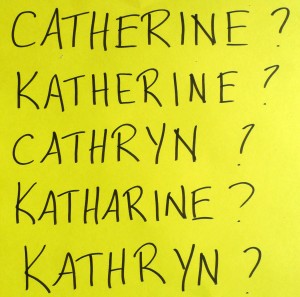Journalists need to get better at spelling names
 Journalists (and experienced ones at that) often misspell people’s names. This doesn’t just make reporters look sloppy, it also raises doubts about the accuracy of the other information in the report. In the first of two posts about spelling, onMedia’s Kate Hairsine gives some tips on how journalists can spell people’s names right.
Journalists (and experienced ones at that) often misspell people’s names. This doesn’t just make reporters look sloppy, it also raises doubts about the accuracy of the other information in the report. In the first of two posts about spelling, onMedia’s Kate Hairsine gives some tips on how journalists can spell people’s names right.
Getting names wrong happens more than you would think, even in renowned publications. In 2011, the New York Times said 16 percent of its mistakes were incorrect names. And in 2012, the Los Angeles Times misspelled the name of the America actor Elliott Gould – for a staggering 47th time since 1985.
Journalist Craig Silverman, who is also the author of the accuracy and verification blog Regret the Error, says in a Poynter article that misspelled names are the sixth most common newspaper error after misquotes, incorrect headlines, numerical errors, general misspellings and incorrect job titles.
“It is one of the easiest things to verify and yet it’s one of the things journalists think about verifying the least,” Silverman is quoted in the article. “We use names on such a frequent basis that it’s the kind of thing that lends itself to assumptions.”
If you think you don’t need to worry about spelling because you work in broadcasting, you’re wrong. In our multimedia age, information from your script can end up on Twitter or Facebook or in an online article. So getting the spelling right – especially of names – is more than important. It’s one of the basic foundations of good journalism.
Here are some tips on spelling people’s names correctly.
Get every person you interview to write their name in block letters in your notebook. Do this even if it seems like a common name. It could turn out that the “John Miller” you just talked to, or took a photo of, actually spells his name “Jon Miller”. Read the name back to your interviewee to make sure you can read their writing.
Ask them to write down their own name rather than spell them out to you. This way you avoid problems if someone has a strong accent or if their English is shaky. Non-native English speakers, for example, often aren’t familiar with the English names of the letters of the alphabet and can make mistakes spelling out even their own name. I’ve come across this regularly.
Even if you are recording an interview and therefore have the name on tape, get the person to write their names down. Just because you can say the name, doesn’t mean you can spell it. I recently recorded an interview with someone whose name, I thought, was the same as the French capital. When he wrote it down for me, it turned out his name was spelled “Parris”.
In telephone interviews, always get people to spell out their names. If you’re doing a telephone interview, you really need to be careful. Make sure you ask the person to spell their name out and READ IT BACK TO THEM afterwards. I usually record my phone interviews, so I also record them spelling out their name. This way I can check how it’s written when I listen back. I find this is especially useful if I’m doing the interview in a language other than English.
Double-check names that have multiple spellings. Is it Steven or Stephen, Mohammad or Mohamed, Kofi or Koffi, or as the New York Times recently lamented in their After Deadline blog, Katharine or Katherine?
Check the name online. When you do this though, make sure you use a primary source such as their own website or their organization’s website where you are less likely to be copying someone else’s misspelling. Facebook and LinkedIn are also good as long as you have the correct person. Don’t simply go with the most common spelling Google throws up as this could be wrong (or a different person). Cut and paste the name into your article to reduce the possibility of making a typo.
How to deal with Arabic, Russian or Chinese names? Some languages are difficult to transcribe into English, so there is no one correct spelling (here’s an Economist blog post on why Muammar Qaddafi’s name is spelled so many different ways). If the person is well known, check how the BBC, the New York Times or The Guardian spells the name by searching their website (but remember, they make mistakes too).
If you’re in doubt, call back to check again. Even if this is embarrassing, it’s less embarrassing that having to publish a correction after publication or broadcast.
Once you have written your report, check the typed name against your notes. You may have made a typing mistake – it’s always worth doing a double-check.



